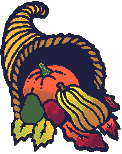

|

|
by Dr. T. A. Raedeke
Beautiful music can only be produced on a violin when the strings of the instrument are under enormous
tension. Similarly, many of the sweetest hymns of the Christian faith have been produced under
conditions that would make most people cry, not sing.
It was about 1647 A.D. in Germany. The Thirty Years War was just about at an end. The war had taken
its toll in caualties, in extreme taxation, poverty and disease. Rev. Martin Rinckart, a Lutheran
minister, was left alone in Eilenberg to minister to the sick and dying at the height of the plague that
claimed 8,000 lives. He conducted more than 4,500 funerals -- often as many as
50 in a single day -- including the burial of his wife. Food was so scarce that grown men foraged the
garbage heaps in search of food. Everywhere there was hunger, sickness and death.
Yet, Rinckart was able to set aside all adversity to give to the Christian church this immortal hymn
of thanksgiving:
|

The first Thanksgiving was held by the Pilgrims in October of 1621 at Plymouth, Massachusetts. After losing half their population the first winter to hunger and sickness, they had planted seeds and were blessed with a large crop. To show their thanks to Almighty God, they declared a holiday and invited their new-found friends the Wampanoag Indians.
 They ate roast duck and geese, clams and shellfish, peas, salad, corn-rye bread, cooked venison provided by the Indians and wine made by the Pilgrims. For 3 days they feasted. They engaged in games of skill, target shooting with bows and arrows and muskets, and dance demonstrations. The celebration spread throughout the colonies and in 1789 George Washington declared November 26 as a day of Thanksgiving. More than 150 years later, it was decided to celebrate Thanksgiving as a National Holiday on the fourth Thursday of November.
|

